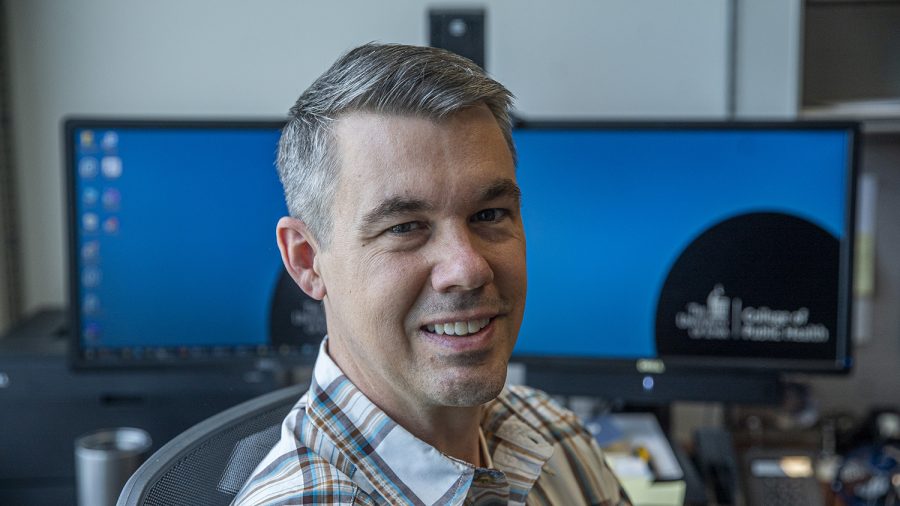UI College of Public Health partners with St. John’s Medical in India to study intimate partner violence
New research at the University of Iowa College of Public Health is studying violence between intimate partners. This research is in collaboration with St. John’s Medical College in India.
University of Iowa Professor William Story poses for a portrait in the College of Public Health on September 25th, 2019.
October 7, 2019
Violence between intimate partners in India will soon be treated with developed intervention and prevention plans based upon ongoing research involving the study and analysis of that violence.
Univerity of Iowa College of Public Health Assistant Professor William Story and co-project investigator Nancy Angeline Gnanaselvam of St. John’s Medical College in Bangalore, India, are collaborating to conduct this research.
A year ago, the research team received a grant from the National Institute of Health Fogarty International Center. The grant included a total of $281,095 for funding to be split between the first and second year accordingly.
Story said he first collaborated with St. John’s Medical College on a smaller scale to see if they worked well together. When that project proved successful, the partnership continued.
The research involves the study of intimate partner violence in peri-urban India — parts of India that experienced rapid change in socioeconomic contrast. His team investigates the relationships between men and women in society, gender roles, and attitudes toward gender-based violence, Story said.
RELATED: Domestic Violence Intervention Program has brought safety and support to the community for 40 years
He said researchers will gather information about social norms surrounding masculinity and social capital by surveying men and women about intimate partner violence and their understanding of gender equality.
“Then, we will interview the younger generations about their understanding of gender roles and their role models for how a man should act,” Story said. “Using what we learn, we want to design an effective intervention to prevent future violence against women.”
Gnanaselvam said project investigators began the interviews and asked subjects about decision-making and a woman’s role in the family.
“In this part of India, it is quite common for people to consider women as second-rate citizens, and there aren’t any guidelines regarding intimate partner violence as of right now,” Gnanaselvam said.
Corinne Peek-Asa, associate dean for research in the UI College of Public Health, specializes in research on family violence and intervention-program implementation and evaluation.
“My expertise will focus on collecting and analyzing data that identifies gender-based factors that might be related to intimate partner violence and help identify roles that men can play in reducing violence,” Peek-Asa said.
International collaborations are both very challenging and rewarding, Peek-Asa said. It is very important to first develop partnerships that are based on trust and respect and to keep a steady mindset of curiosity and learning.
“We have truly benefitted and learned from the distance. If they run into a problem, they find a solution and foresee any possible difficulties,” Gnanaselvam said.
Story said the project relies on mutual trust between UI researchers and their counterparts at St. John’s Medical. The team clearly defines roles and delegations and has faith that everyone will do their part to the best of their ability, Story said.
“If you really trust the person you’re working with, you thrive by allowing each other to do what you are good at, and there is no need for micromanagement,” Story said.
Gnanaselvam said the UI is communicating properly with its partners in India and is professional despite the distance.
“I often get asked why I chose to work in maternal and child health, a predominantly female field,” Story said. “… But I feel my perspective is important to advocate for how men can change and fight for women’s health.”
RELATED: Fulbright recipient focuses on women’s health issues in India






